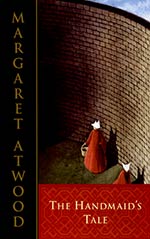
![]() llLeoll
llLeoll
3/14/2013
![]()
Wow. I was simply amazed by this book.
My first foray into Atwood's writing came about a year ago. I was looking for The Handmaid's Tale in the local library, but it was checked out. So I settled for the more recent Oryx and Crake, which I thought both well written, but poor and largely implausible as a work of Science Fiction (SF). I also had issues with the characterization, which I found weak. And the plot, which I found contrived. Though at times, like during Atwood's building of Oryx's back story, very poignant and compassionate, I did not think that enough to save the novel.
So I was apprehensively approached Handmaid. But I'm glad I did. Because this book is amazing.
Seldom in SF will you meet a character as fully realized as Offred. I really felt that I was in her head every second of the time. I could feel her confusion, her loneliness, and dehumanization. And she felt real. She was no hero, but fantasized about other, more active people she knew, like Maura, being heroic. And smashing the strict societal controls about her in this near-future, religio-fascist dystopic America.
Interstingly, Offred is aware of her weakness. And is often shamed by it. But she also knows that the will to live is strong in her. I found this very compelling. Atwood's portrait of her as a victim, consumed by both a desire to live, and yet the slender desire to "be real" strikes me as poignant. Because Offred, currently relegated to an abstraction as a Handmaiden - a fertile pair of ovaries in a totalitarian regime where most women are infertile - remembers "the time before" the takeover by the religious regime.
Most chilling, though, is her realization that she is one of the last that will remember. Her daughter, who was taken from her, will not remember.
And Offred's narration is also quite captivating. She bitches and moans. She digresses. She often her petty jealousies and her paranoia to shine through her words. And she frequently plunges us right into the middle of scenes - notably, for instance, out of the blue we are told "He is f***ing me." It was shocking. And, like the society it came from, quite sterile.
I also found the world building in Handmaid to be superlative: Plausible, with just enough details given to make it seem real. Which made me buy it in a way I seldom buy most SF worlds I have come across. And i like that the focus is not the technology and the government, but people live their day-to-day lives in that world. Because, from the small, we get a pretty accurate picture of the big. We understand how the government of Gilead has used fear to control the populous. Not by knowing the mechanism, but by inferring it. Things like the color of dresses - red for Handmaids, and blue for wives. And the public executions, and that the government left corpses hanging as a warning. And their use of the Eyes. And structure of power, with Commanders being at the top. And the ever present fear of becoming an un-person. Or of going to the labor camps.
All in all, Atwood has pulled this off better than any writer I can think of. Though many have tried, only Orwell and Huxley built their dystopias as well. And, because of the character's she has given us, I think Atwood's book is the best of the lot.
I do, of course, have some quibbles. I thought that the final postscript given at a future historical conference attended by Gilead specialists detracted from the overall effect. I would have preferred the ambiguity of the ending of Offred's narration. This left all sorts of questions opened. And I like a certain poetic lack of closure that this end implied. But that, of course, is me.
My other quibble is the location of Gilead. A bible-thumping republic would garner deeper support in the deep south than the relatively humanistic and educated north east of America. My guess is that the northeast and northern halves of the Great Lakes states would - along with the Pacific rim states - separate from any theocracy. But that is just a quibble based on 2013 realities that may not have been prevalent when the book was released in the 80's.
In summary, I would recommend The Handmaid's Tale to anyone interested in both literature and people interested in science fiction. It would also appeal to people who are interested in social issues, and want to think, and imagine an experience as opposed to being preached at. Overall, a very impressive book. Powerful ideas. Stunning, believable and emotion-generating characters. And a plausible, well executed example of Science Fiction world building.
Leo Walsh is a writer, who splits his time between California and Cleveland, Ohio. Catch him at leo-walsh.com.